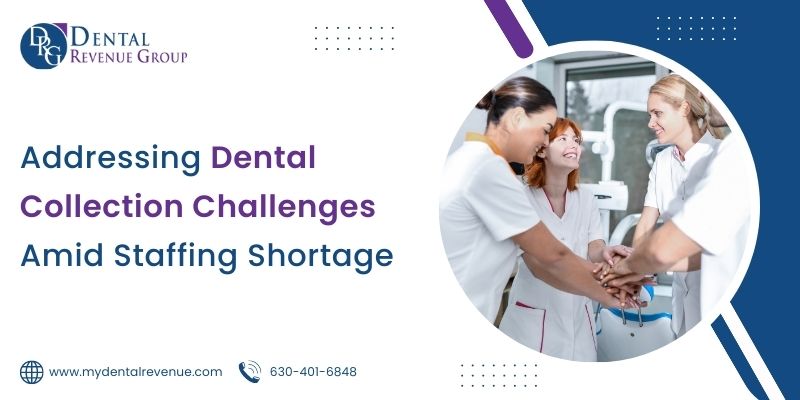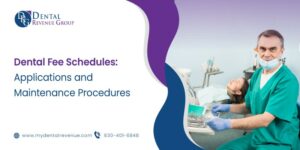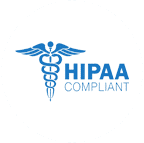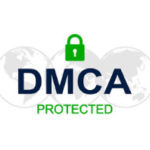In today’s economic climate, the dental industry is grappling with a healthcare staffing shortage, causing a significant impact on revenue. Furthermore, the healthcare staffing shortage exacerbates the dental patient cancellation rate, further impeding revenue generation. Insufficient staff resources hinder promptly addressing dental patient cancellations, leading to potential revenue loss. By optimizing these systems, dental teams can enhance their ability to collect revenue promptly and improve their financial health.
Understand The Challenges Of Healthcare Staffing Shortage in Dental Patient Collections
Limited Resources for Implementing Best Practices in Patient Billing
- Short-staffing restricts resources available to implement effective best practices in the dental patient billing process, leading to suboptimal revenue outcomes.
- With limited staff time and a task-focused approach, workflows often lack necessary adjustments and technological upgrades to optimize dental patient revenue.
Impediments to Accurate Cost Estimates and Timely Balance Collection
- Healthcare staffing shortage often result in an inefficient insurance verification process, making providing accurate cost estimates for dental treatments challenging.
- Collecting payments from patients becomes more difficult without up-to-date patient insurance data factoring into calculating out-of-pocket estimates.
- Insufficient staffing resources hinder the quick and accurate processing of insurance claims, which delays the collection of patient balances.
- Dental practices can foster greater patient trust by improving benefits verification speed and accuracy, increasing payment compliance.
Limited Resources for Explaining Patient Financial Responsibility
- Limited resources hinder the thorough explanation of patients’ financial responsibility during the treatment plan presentation, impacting dental patient collections.
- Short-staffing reduces the time to ensure an effective treatment plan presentation, leading to potential misunderstandings.
- Insufficient communication with patients can decrease dental patient collections and harm overall revenue.
Impact on Patient Satisfaction
- Limited frontline staff prevents healthcare providers from giving undivided attention to patients, as they often get tied up with administrative tasks, such as dealing with insurance representatives for extended periods.
- With inadequate staffing, check-in, wait times, and check-out processes become burdensome, leading patients to perceive disorganization within the practice, which diminishes trust and strains relationships.
- Patients with consistently unpleasant experiences due to Healthcare staffing shortage may seek care elsewhere, resulting in lost customers.
- With only a small team at the front desk, healthcare providers have limited time to ensure patient satisfaction, impeding the development of a robust and customer-centric business model.
- Allocating sufficient resources to prioritize patient satisfaction serves as a fundamental element of a successful business model in healthcare.
Examine Healthcare Staffing Shortage Effects on Dental Patient Collections in the USA
The healthcare staffing shortage in the United States has become a significant challenge, affecting various healthcare sectors, including dentistry. This shortage of qualified dental professionals, including dentists, dental hygienists, and dental assistants, has profoundly impacted the operations of dental practices nationwide. One area that has been particularly affected is dental patient collections, with significant implications for both dental providers and patients. This research paragraph aims to show how the healthcare staffing shortage affects dental patient collections in the USA.
|
Factors |
Effects on Dental Patient Collections |
| Limited Availability of Dental Services | The shortage of dental professionals has reduced appointment availability, longer wait times, and increased demand for dental services. As a result, patients may face delays in receiving necessary treatments, leading to longer outstanding balances and increased difficulty in collecting payments. |
| Increased Workload on Existing Staff | The burden of providing dental care falls on the shoulders of the remaining dental staff, leading to increased workloads and reduced efficiency. Dental providers and administrative staff may find it challenging to allocate sufficient time for patient billing and collections, potentially resulting in delayed invoicing and a subsequent increase in outstanding patient balances. |
| Decreased Focus on Financial Operations | With limited staffing resources, dental practices may need to prioritize patient care over administrative tasks, including billing and collections. This can lead to a lack of dedicated attention to financial operations, resulting in delayed follow-up on unpaid invoices, ineffective payment tracking, and increased difficulty in collecting outstanding debts. |
| Potential Errors in Billing and Documentation | The increased workload and stress on the existing dental staff can increase the likelihood of billing errors and incomplete documentation. Inaccurate billing and documentation can create confusion and disputes between dental practices and patients, further delaying the collection process and hindering timely payments. |
| Strained Patient-Provider Relationships | Long wait times, reduced availability, and increased administrative challenges stemming from the healthcare staffing shortage can strain the patient-provider relationship. Patients may become frustrated with the difficulties in accessing dental care and the subsequent impact on their financial responsibilities. This strain can lead to patient dissatisfaction, decreased loyalty, and potential reluctance to fulfill outstanding payment obligations. |
Strategies To Enhance Dental Patient Collections During Healthcare Staffing Shortages
One effective solution for increasing patient collections during a healthcare staffing shortage is to leverage expert support. By seeking assistance from industry professionals, healthcare practices can easily achieve success in optimizing their revenue cycle.
Working with experts in revenue cycle management services provides numerous benefits:
Access to the latest strategies and technology:
Partnering with revenue cycle management experts grants access to cutting-edge strategies, industry best practices, and advanced technology solutions. This ensures the adoption of effective and up-to-date approaches for maximizing patient collections.
Streamlined insurance verification using technology:
Revenue cycle management services employ technology-assisted insurance verification processes. By leveraging advanced tools, they can ensure the accuracy of patients’ insurance coverage data. This leads to more precise cost estimates and expedites the payment of insurance claims.
Implementation of automated patient billing systems:
Expert revenue cycle management services offer automated patient billing systems. These systems send prompt payment reminders to patients and provide various payment options. By automating the billing process, practices can enhance efficiency and convenience.
Cost-Effective:
Automated processes for sending timely statements and reminders prove cost-effective and efficient. Effective communication plays a pivotal role in enhancing patient acceptance and transparency. Providing frictionless payment options on patients’ preferred devices increases the payment likelihood. Embracing paperless payments accessible on patients’ devices streamlines the payment process, ensuring convenience and ease of use.
Proficient insurance claims management:
Revenue cycle management experts possess the necessary expertise to handle claims efficiently. They can reduce claim denials, manage appeals effectively, and proactively follow up to ensure patients receive the maximum benefits from their insurance coverage.
Cultivate a Healthy Work Environment:
Ensure each team member understands their roles and responsibilities within the practice. This eliminates confusion and prevents tasks from falling through the cracks. Regularly scheduled weekly meetings allow everyone to discuss their progress, goals, and concerns. This promotes effective collaboration and helps to address any issues or challenges promptly.
Promoting Work-Life Balance:
Recognize the importance of work-life balance, especially in today’s post-pandemic work environment. Make it a priority to create a supportive workplace culture that values your employees’ personal lives and well-being. Consider implementing flexible work schedules that accommodate the needs of your employees. Engage in conversations with them to understand their preferences and find mutually beneficial solutions. This could include adjusting start and end times, allowing for shorter or longer workdays, or exploring alternative scheduling arrangements. If they have obligations outside of work, such as family-related activities, find ways to accommodate their needs while still maintaining the operational requirements of the practice.
Implementing Incentive Programs:
Acknowledge the significance of financial rewards by creating incentive programs for your dental practice team members. These programs can include bonuses, gift cards, or additional paid time off as rewards for achieving specific goals or milestones. Incentive programs provide a strong motivation for employees to excel in their roles. The anticipation of rewards and recognition instills a sense of excitement and satisfaction, fostering a positive work environment and boosting overall team morale. Promote your incentive programs as part of your recruitment efforts. Highlighting increased compensation and recognition opportunities can attract potential candidates motivated by such incentives, thereby expanding your talent pool.
The Bottom Line
In conclusion, the healthcare staffing shortage in the USA has significantly affected dental patient collections. The limited availability of dental services has contributed to the challenges in collecting payments from dental patients. These effects highlight the need for dental practices to adapt and implement innovative solutions to mitigate the impact of the staffing shortage. The dental industry must address this staffing shortage issue to ensure timely access to dental care while effectively managing dental patient collections.











